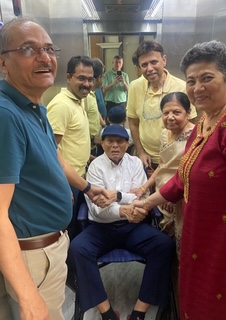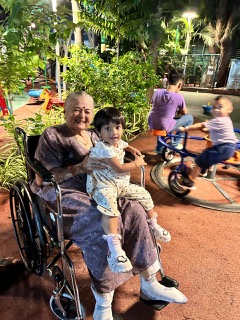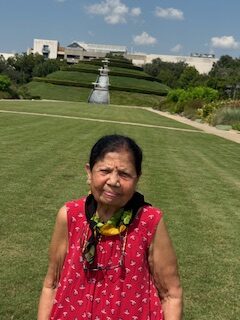Four Lives that Shaped Mine
Every married person I know has the same invisible responsibility — caring for four parents. Two who raised you, and two who raised the person you married. Nobody tells you that your forties and fifties are a time when life quietly turns the tables — you stop being someone’s child and start being someone’s caretaker. And it’s beautiful, confusing, heavy, and sacred all at once.
I’ve lived through all shades of it. And though I’m still figuring it out, here’s what I’ve learned — the only way to cope is to keep your heart open, even when your energy runs out.

My Father: The Independent One
My father, Jaisukhlal Sheth, was a man who valued his independence more than anything. He had a weak heart and the doctors had suggested surgery for his valve, but he decided against it. Not because he was afraid — but because he didn’t want to fight a battle that, to him, felt unnecessary. He hated hospitals, hated being dependent, and even in his final days, wanted to do everything himself.
At the time, I struggled with his decision. I wanted him to choose life — or at least, what I thought was life. But as I look back now, I realize he did choose life — just his own version of it. His quiet strength taught me that dignity and choice matter as much as breath itself.

My Father-in-Law: The Fighter
My father-in-law, Chimanlal Shah (CVS) was completely the opposite. He lived with Parkinson’s for years, but never let it define him. For the last five years of his life, he had a helper, yet he would still insist on walking, traveling, showing up for everything. “Take me anywhere,” he would say, and mean it.
Even when his body began to fail him, his spirit didn’t. I still remember when the food pipe had to be inserted — he’d pull it out and look annoyed at anyone who told him to rest. When the ventilator was finally removed, we were told it was a matter of hours… but he lived for ten more days. Ten days of sheer willpower. He loved people, and he loved life, and even as he slipped away, he reminded us what it means to never give up.

My Mother: The Religious Role Model
My mother, Vilas Ben is still with us — a strong woman, though age has slowly crept in. She stays with my sister now, surrounded by kids, energy, and the kind of noise that keeps her heart alive. But deep down, she still longs to go to my brother’s home. The home that she built.
It’s not that she’s unhappy where she is — it’s something deeper. For her, a son’s home feels like her rightful place, her comfort zone, the space that completes her. But her religious faith carries her through. Her religious learning has given all of us siblings a strong sense of righteousness and faith. I have had a very comfortable life and seeing me struggle through a recent thorn in life she said “Be careful, all your good fortunes can end. Never take things for granted.” I think at some point all our parennts blessings end and we have to make our own blessings. Through our deeds. That lesson stays strong with me.

My Mother-in-Law: The One Learning to Start Again
And then there’s my mother-in-law, Sarla. She’s still finding her footing after my father-in-law’s passing. For decades, she was part of a “we” — now she’s just “me.” That’s not an easy transition.
She’s learning to live alone, to fill her own time, to redefine her role in a family where her partner is gone but her presence still matters. Some days she’s strong and talks about the future; other days, she drifts into memories. Watching her adjust makes me realize how aging isn’t just about physical decline — it’s about slowly letting go of who you used to be.
The Balancing Act
And here’s where it gets complicated. How much do I stretch myself for them? How much do I expect my kids to stretch for me one day? It’s such a fine line.
When you’re in the middle generation, you live in two worlds — you want to be there for your parents, but you also don’t want to lose yourself. You want your kids to help, but you don’t want to burden them. Every decision feels like a balancing act between love and exhaustion, between duty and personal peace.
There are days when I feel guilty — like I’m not doing enough. And then there are days when I feel proud — because I am doing something that matters. The truth is, no one gets this right. There’s no perfect way to take care of aging parents. There’s only effort, compassion, and a lot of forgiveness — for them, and for yourself.
What I’ve Learned Along the Way
Taking care of your elders is your privilege. That’s how I’ve started to see it. It doesn’t always feel like one, especially when your own life feels chaotic, but it truly is.
They give back in ways that aren’t always visible — their presence, their blessings, their stories, their quiet guidance. They fill your home with history, and in their own way, they remind you what really matters.
Yes, your freedom takes a hit. Your perfectly planned life might fall apart. But slowly, if you give it time, something else takes root — a deeper sense of purpose. You start organizing your life better, you learn patience, and sometimes, you even surprise yourself with how much love your heart can still hold.
The Blessing Behind the Burden
When I look back, I realize that every struggle with my elders brought with it a hidden gift. My father’s quiet acceptance taught me peace. My father-in-law’s fight taught me resilience. My mother’s longing taught me compassion. And my mother-in-law’s adjustment taught me grace.
Taking care of them hasn’t always been easy. It’s taken energy, time, and sometimes even tears. But it’s also grounded me. It’s connected me to something much larger than myself — the cycle of giving and receiving that keeps families alive long after we’re gone.
So if you’re in that space — juggling parents, kids, and yourself — know this: you’re not alone, and you’re doing better than you think.
A Gentle Reminder
Caring for your elders is not just about duty; it’s about love in motion.
It might cost you your time, but it gives you perspective.
It might take your freedom, but it gives you blessings.
And somewhere in between, it quietly shapes you into someone softer, stronger, and more human.
Because at the end of the day, caring for those who once cared for you — that’s one of the most meaningful things we’ll ever do.